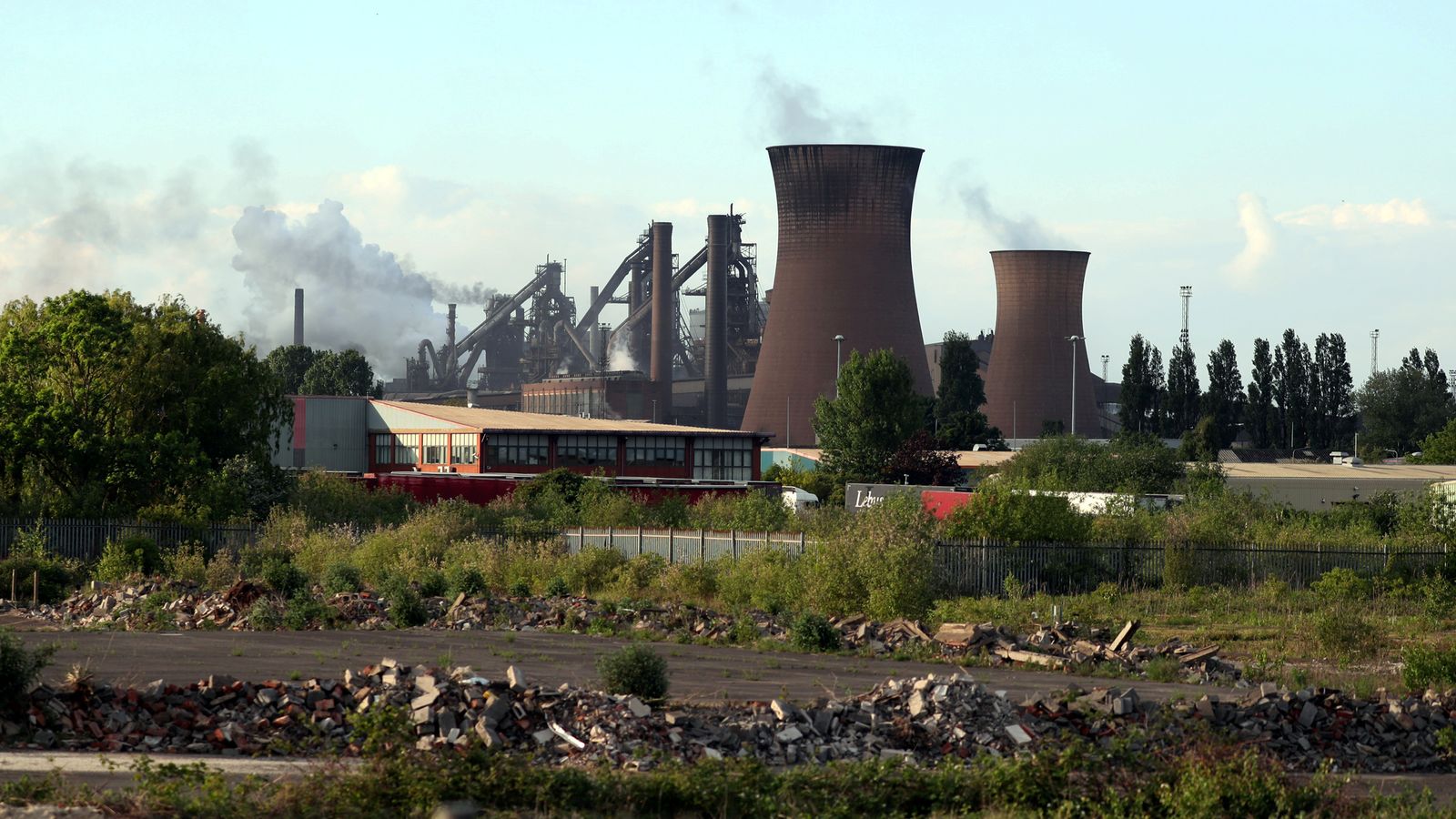Britain’s second-biggest steel producer has been drawing up secret plans to axe hundreds of jobs even as it continues talks with ministers about £300m of taxpayer funding that would partly depend on decade-long employment guarantees.
Sky News has learnt that British Steel has been discussing launching a consultation on around 800 redundancies, principally focused on the Scunthorpe plant in north Lincolnshire where the company is based.
One industry insider said there was a possibility that trade union officials could be briefed on the proposals as early as Wednesday, although there remained a possibility that their disclosure could be delayed pending the outcome of negotiations with the government.
The planned cuts would arise from the closure of coke ovens, although Scunthorpe’s two blast furnaces and other mills within the Chinese-owned group would continue to operate, the insider said.
Any redundancy proposals would be certain to draw a sharp response from the government given that its offer of £300m of state support is partly predicated upon providing jobs guarantees lasting for a decade.
A source suggested job cuts would “complicate” the talks between the two sides.
Last week, Sky News revealed that British Steel and larger rival Tata Steel would be required to guarantee thousands of jobs until 2033 in return for £600m of government support to help decarbonise the industry.
Strikes latest: UK enduring biggest day of industrial action in more than a decade
House prices continue fall but saving for a deposit remains difficult
UK inflation: Shop prices yet to hit their peak – despite record highs seen in January
Grant Shapps, the business secretary, has told the companies that the proportion of their workforces that would need to be secured would be determined after further discussions.
A six-month moratorium on redundancies is another one of the conditions of the government offer.
The taxpayer funding is to be linked to the replacement of blast furnaces at the company’s sites with greener electric arc furnaces.
Jingye Group, British Steel’s owner, would be obliged to invest at least £1bn in the business by 2030, with Tata Steel expected to be asked for a similar commitment.
The decision to grant the state aid is not without controversy, given British Steel’s Chinese ownership and doubts about its adherence to financial commitments made when it bought the business out of insolvency proceedings in 2020.
In a letter to Jeremy Hunt, the chancellor, in December, Mr Shapps and Michael Gove, the levelling-up secretary, warned that British Steel’s demise could cost the government up to £1bn in decommissioning and other liabilities.
They cautioned Mr Hunt that British Steel “does not have a viable business without government support”.
“Closing one blast furnace would be a stepping-stone to closure of the second blast furnace, resulting in a highly unstable business model dependent on Chinese steel imports,” Mr Shapps and Mr Gove wrote.
“Given the magnitude of the liabilities due to fall on HMG in the event of blast furnace closure, and following the PM’s steer, we would like officials to test whether net Government support in the region of £300m for British Steel could prevent closure, protect jobs and create a cleaner viable long-term future for steel production in the United Kingdom.”
They also argued that retaining sovereignty over steel production was critical to the UK economy.
“Every other G20 nation has maintained domestic steel production and, while we do not think that this should come at any cost, we do believe it is in HMG’s interest to offer well-designed and targeted funding which unlocks private investment, achieves a good outcome for taxpayers, and enables transformed , decarbonised and viable domestic steel production to continue in the UK in the long-term,” Mr Shapps and Mr Gove wrote.
“We do not want to become reliant on steel sources elsewhere in the same way that energy security has become self-evidently important.
The fate of British Steel, which was bought by Jingye out of an insolvency process just under three years ago, has become increasingly unclear in recent months as the current owners have indicated that they would not maintain its operations without taxpayer funding.
British Steel employs about 4,000 people, with thousands more jobs in its supply chain dependent upon the company.
Tata Steel employs substantially more people in the UK, including more than 4,000 at its Port Talbot steelworks in Wales.
According to last month’s letter, British Steel had already informed the government that it could close one of the Scunthorpe blast furnaces as soon as next month, with the loss of 1,700 jobs.
This would be “followed by the second blast furnace closing later in 2023, creating cumulative direct job losses of around 3,000”, Mr Shapps and Mr Gove wrote.
In May 2019, the Official Receiver was appointed to take control of the company after negotiations over an emergency £30m government loan fell apart.
British Steel had been formed in 2016 when India’s Tata Steel sold the business for £1 to Greybull Capital, an investment firm.
As part of the deal that secured ownership of British Steel for Jingye, the Chinese group said it would invest £1.2bn in modernising the business during the following decade.
Jingye’s purchase of the company, which completed in the spring of 2020, was hailed by Boris Johnson, the then prime minister, as assuring the future of steel production in Britain’s industrial heartlands.
British Steel and the Department for Business, Energy and Industrial Strategy have been contacted for comment.




